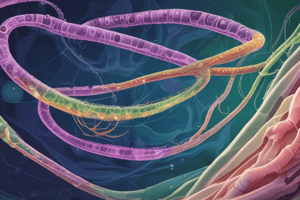Podcast
Questions and Answers
What is the number one cause of Peptic Ulcer Disease (PUD)?
What is the number one cause of Peptic Ulcer Disease (PUD)?
- H. Pylori (correct)
- NSAIDs
- Diet
- Stress
What is the minimum treatment regimen for H. Pylori?
What is the minimum treatment regimen for H. Pylori?
Three antibiotics plus PPI for 10-14 days
Amoxicillin disrupts the cell wall of H. Pylori.
Amoxicillin disrupts the cell wall of H. Pylori.
True (A)
Clarithromycin inhibits __________.
Clarithromycin inhibits __________.
Tetracycline is contraindicated in pregnancy and can stain teeth.
Tetracycline is contraindicated in pregnancy and can stain teeth.
What is the main concern of using Metronidazole?
What is the main concern of using Metronidazole?
What are the specific treatments approved for women with IBS?
What are the specific treatments approved for women with IBS?
Which medications are used for Inflammatory Bowel Disease?
Which medications are used for Inflammatory Bowel Disease?
What causes Iron Deficiency Anemia?
What causes Iron Deficiency Anemia?
Cyanocobalamin is used to treat Vitamin B12 deficiency.
Cyanocobalamin is used to treat Vitamin B12 deficiency.
Pregnant women require a minimum of __________ of folic acid.
Pregnant women require a minimum of __________ of folic acid.
Flashcards are hidden until you start studying
Study Notes
H. Pylori
- Number one cause of PUD
- Causes: NSAIDS
- Treatment: minimum of 3 antibiotics + PPI for 10-14 days
Antibiotics for H. Pylori
- Amoxicillin:
- Low rate of resistance
- Disrupts cell wall
- Give antisecretory agent (omeprazole) to enhance antibacterial activity
- Clarithromycin:
- Inhibits protein synthesis
- Bismuth (Pepto-Bismol):
- Disrupts cell wall of H. Pylori
- Side effects: black discoloration of the tongue and stool, long-term therapy can cause neurologic injury
- Tetracycline:
- Inhibits protein synthesis
- Resistance is rare
- Interacts with many medications, causes photosensitivity
- Do not use in pregnancy and young children, stains teeth
- Metronidazole:
- Effective against sensitive strains
- Avoid alcohol (disulfiram-like reaction)
- Tinidazole:
- Similar to Metronidazole
Diarrhea
- Diphenoxylate + atropine (Lomotil): opioid, atropine discourages abuse
- Difenoxin + atropine (loperamide): opioid
- Bismuth subsalicylate
- Bulk-forming agents
- Anticholinergic antispasmodics
- Management:
- Antibiotics should only be used for: salmonella, shigella, campy, or clostridium
- Traveler's diarrhea: e.coli self-limiting if not cipro, norfloxacin, Azithro in children
IBS
- Diagnosis: present for 12 weeks/3 months over the past year
- Treatment:
- Alosetron:
- Approved for women only
- GI toxicities, constipation, perforation, and ischemic colitis risk management program
- Eluxadoline
- Lubiprostone:
- Approved for women >18
- Minimal benefits
- Linaclotide:
- Tx IBS with constipation and chronic idiopathic constipation
- Works by increasing intestinal fluid secretion
- Alosetron:
Inflammatory Bowel Disease
- Crohn disease and Ulcerative colitis
- Treatment:
- Budesonide (Glucocorticoids):
- Mild-mod Crohn's
- Prolong use can cause adrenal suppression, Cushing syndrome, osteoporosis, and increased infection risk
- Sulfasalazine (5-aminosalicylates):
- Reduces inflammation
- Mild-mod UC
- Azathioprine (immunosuppressants):
- Induce/maintain remission in both UC and Crohn
- Reserved for patients who have not responded to traditional therapy
- Infliximab (immunomodulators):
- Same as reserved patients
- Mod-sev Crohn and UC
- Increased risk of infection, yearly TB screening
- Metronidazole and cipro:
- Ineffective for UC
- Budesonide (Glucocorticoids):
Iron Deficiency Anemia
- Imbalance in iron uptake and iron demand
- Causes: pregnancy, infancy, chronic blood loss (find the underlying reason)
- Labs:
- Decreased reticulocyte count
- Decreased ferritin
- Increased serum iron-binding capacity (IBC)
- Treatment:
- Ferrous sulfate:
- 325mg 2-3x daily
- Give on an empty stomach if possible
- Monitor HH and ferritin in 4 weeks
- AE: staining of teeth
- Vitamin C and ascorbic acid enhance absorption but can increase AE, do not give with antacids and tetracycline
- Ferrous sulfate:
Vitamin B12 Deficiency
- Causes: strict vegetarians, impaired absorption disease, and alcohol, absence of intrinsic factor: pernicious anemia
- Treatment: Cyanocobalamin SQ or IM
Folic Acid Deficiency
- Women of childbearing age or pregnant women require extra folic acid
- 400mcg for non-pregnant/lactating women
- In pregnancy: at least 600mcg
- Treatment:
- 1-2 mg/day for deficiency
- IM injection of B12 helps stimulate
- Do not give folic acid routinely, can mask B12 deficiency if present
Studying That Suits You
Use AI to generate personalized quizzes and flashcards to suit your learning preferences.



